Photoshop
InDesign
Illustrator
Animate
After-Effects

CMST320 Illustration Graphics, Fall 2021
Adobe Illustrator
The pen tool, shapes, and gradients are used to create two unique stamp designs with a unifying theme. A rule of thirds is used in the placement of the main topic, the images of the male and female Monarch butterflies, as well as the thistle and Black-Eyed Susan flowers. The milkweed plant is split between the left and right stamps. USA is in strong, sans serif font making it stand out in the design. A more flowing serif font is used for the name of the butterflies and once converted to outlines, some of the letters were manipulated or distorted by enlarging and/or using puppet warp tool.
CMST311 Advanced Electronic Publishing, Fall 2020
Adobe InDesign
Create a digital version of a magazine that can be displayed on a tablet device. Ten pages were selected and reproduced using Adobe InDesign and Photoshop, and each page contains interactive elements. Navigation controls, Home, and Table of Content buttons were added. As you click through, look for the following:

Picture of original magazine cover. Photo credit: Anna Sawyer Letaw
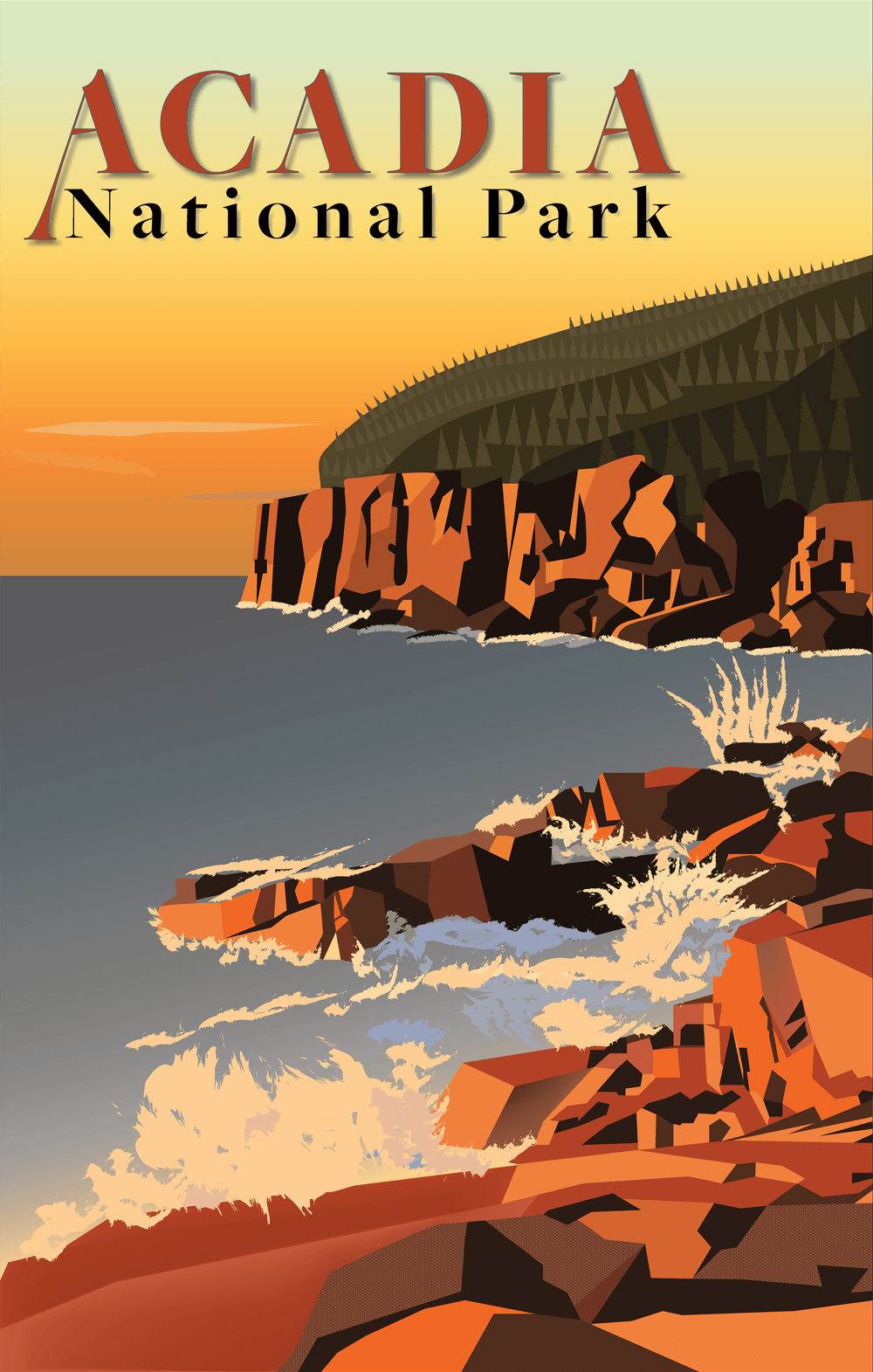
CMST320 Illustration Graphics, Fall 2021
Adobe Illustrator
The Acadia National Park poster design is based on a scene from Ocean Drive, the iconic motorway and walking trails within the park that take visitors along the dramatic, Eastern shoreline of Mount Desert Island, Maine. The modern design approach is both fun and a classic look for this 92-year-old park, and yet anyone who has been on Ocean Drive, will be able to recognize this view. The warm, intense sunrise glow provides a vivid color palette with which to highlight the rocks and bring attention to the name of the park. The chosen serif font is reminiscent of an old Acadia poster which enhances the classic feel of the image. While some shapes were used to create the rocks, the pen and mesh tools along with patterns and color were used to create effective depth and texture to the rocks. A tree pattern was created by using shapes and the pathfinder tool and then placed using the pattern brush. The gradients in the sky and ocean help create the illusion of distance, as well as the clouds near the horizon line.
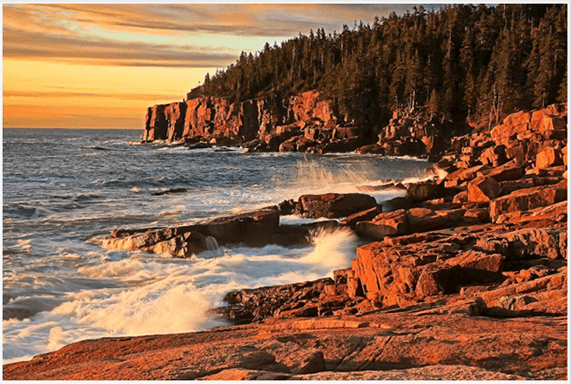
Photo of Otter Cliffs used to create the poster. Photo credit: US Department of the Interior. (March 28, 2018). Otter Cliffs, Acadia National Park [photo]. Retrieved September 28, 2021, from the Facebook page of the US Dept. of the Interior
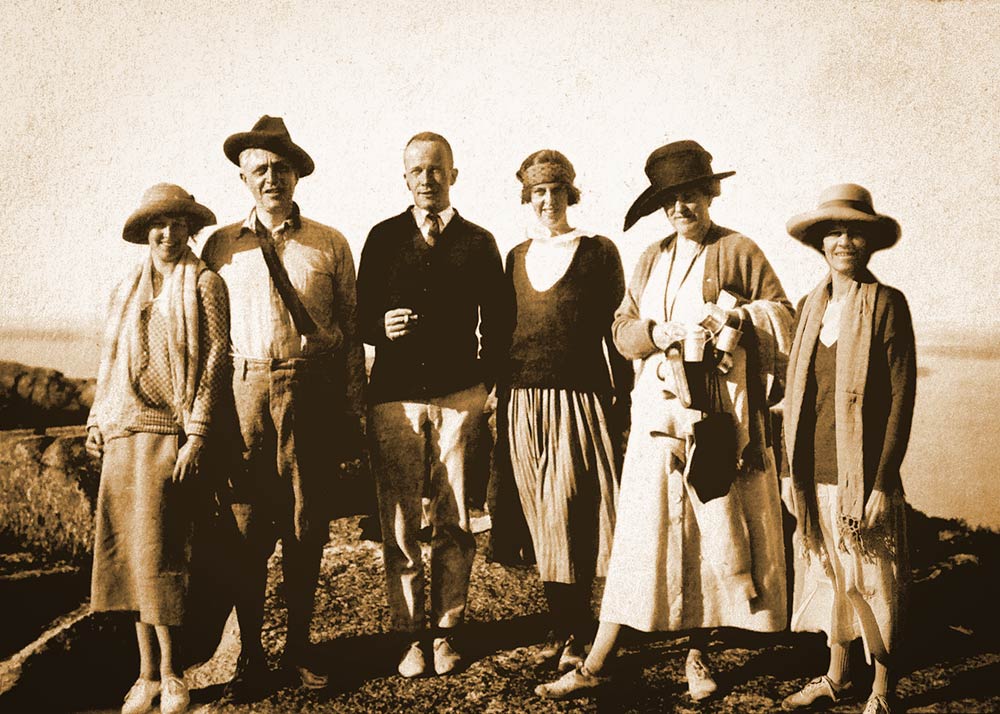
CMST325 Image Editing, Spring 2021
Adobe Photoshop
Use Photoshop and composite techniques to create a multi-layer image that “realistically” places you in a significant event in history. The original image used is an old family photo taken on top of a mountain in Maine in 1917. To add myself, I attempted to dress in a similar period clothing, facing an appropriate direction with the sun at an approximately similar angle.
My process was to first make adjustments and corrections to the original using spot healing, content aware, and adjusting levels, curves, and hue/saturation. Then, for my photo, I reduced the size, and used select-and-mask to extract my image. The photo was then converted it to black and white, the color levels adjusted, and I added noise and blur. An inner shadow was added to create depth and the blur tool was used to remove detail. The burn tool was used to add dirt to my shoes and darken areas of my face. Finally, a vignette was added, and the color levels adjusted to add age to the final image.
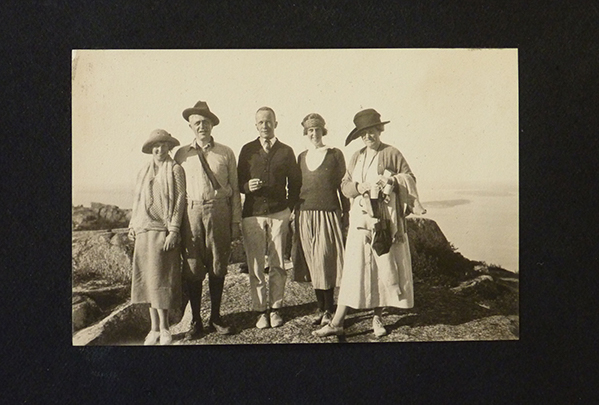
Original family photo. Photo credit: Anna Sawyer Letaw
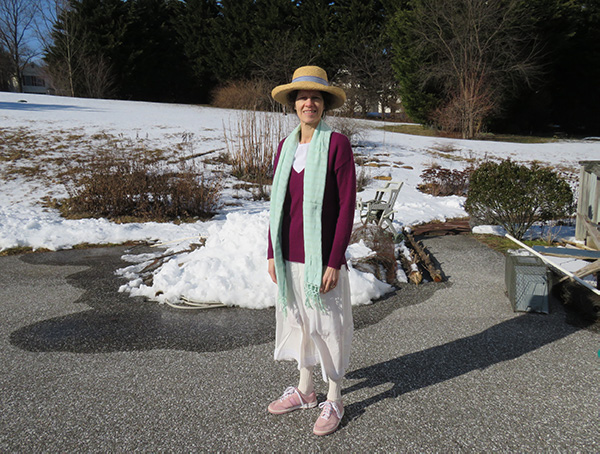
Current photo. Photo credit: Anna Sawyer Letaw
CMST351 Motion Graphics I, Summer 2021
Adobe After Effects | Adobe Animate
Production Goal: Informational video about the water cycle.
Production Concept: With the use of animation, this 3.17-minute video takes viewers on a tour of the water cycle which demonstrates how the sun’s energy is a catalyst for changing water into vapor, the effects of condensation and precipitation, then finally returns to the beginning as the sun starts to shine again.
Project requirements included creating a storyboard to illustrate the high-level understanding of the project and convey the project’s requirements. Additional requirements included the use of effects, mask feathering, 3D, perspective, audio, and transitions. Other techniques used included key framing, transformations, and rendering.